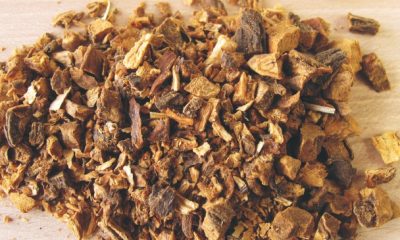Food
Benefits of galangal and how to make it

Table of Contents
Discover the benefits of galangal root tea and how to make it.
Rhizome of the Zingiberaceae family, close to ginger, from the Alpinia galanga or Alpinia officinarum variety, with us, you can buy galangal, and use it in many ways, including as an infusion, in particular, to take advantage of its virtues for health.
Discover the recipe for galangal herbal tea, as well as the properties of galangal infusion for health, and advice on how to use it best.
The medicinal information in this article is for informational purposes, in case of any health problem, consult a doctor.
Recipe for galangal tea
Ingredients
• 1 g of galangal rhizome
• 250 ml of water
Preparation of the recipe
- Put the root in cold water. Make a decoction, that is to say, heat the water, then, at the boil, let boil for another 2 minutes, then remove from the heat.
- Leave to infuse for 10 minutes, ideally covered, so as not to let the essential oils evaporate.
- Add, if desired, honey and lemon.
Tips for use
It is generally advisable to drink one cup, up to 3 times a day. It gives a powerful drink with spicy notes, really delicious.
Health benefits of galangal
Galangal has many benefits on digestion. With its anti-inflammatory and analgesic properties, it is recommended for digestive disorders, such as stomach aches, spasms, gas, bloating, vomiting, etc.
Galangal would help heal ulcers and relieve chronic or temporary inflammation of the digestive tract.
Galangal has antiemetic properties, that is to say against nausea and vomiting, in particular against motion sickness, but also nausea of pregnancy, but in small doses, and with the agreement of the doctor.
It has tonic properties to fight against asthenia and all its symptoms: weakness, physical fatigue, mental fatigue, loss of libido, etc.
In traditional Chinese medicine, galangal is prescribed against abdominal pain, vomiting, diarrhea, and for its antibacterial effects. It is also credited with action against pain, in particular against rheumatic pain and osteoarthritis.
Galangal is renowned for its antiseptic, antifungal, antiviral, and anti-tussic properties, which makes it a stimulant of the immune system and a natural remedy against winter ailments: colds, flu, nasopharyngitis, etc.
Final thought
The galangal rhizome was widely used by the famous Hildegard of Bingen, nun, and doctor of the 13th century, mother of naturopathy, who prescribed the root for its stimulating and carminative properties. In her books, she nicknames galangal “spice of life” about its benefits.
Food
6 Benefits of sweet orange essential oil

Table of Contents
Food
6 Benefits of green garlic and side effects

Table of Contents
- Nutritional value of green garlic
- Health benefits of green garlic
- How to select and store green garlic
- Culinary uses of green garlic
- Side effects of green garlic
- Discover the 6 shocking health benefits of green garlic and side effects.If you work with vegetables, then you know that green garlic is not only an early sign of spring flowers but is also a delicious addition to a nutritious diet
What is green garlic?
Green garlic is an immature garlic plant, which is harvested before it grows into the familiar mature bulb.
This plant has a leafy stem and flowers, which means that it is ready to be picked, even though the bulb is not fully formed.
The immature bulb resembles a chive in size and appearance and is even prepared in the same way at meals.
Many people use green garlic as an early-season substitute for garlic, as it has the flavor of garlic, without a lot of spicinesses.
Garlic is the star food in medicinal properties, especially to deal with various pathologies
People also look for green garlic because it has the same nutritional composition as traditional garlic.
Garlic is known to be packed with nutrients that can complete your diet and it is also a versatile spice that adds a special kick to different meals.
Since this vegetable is only available for a few weeks each year, it is important to harvest and enjoy eating it whenever you can!
Nutritional value of green garlic
This particular type of garlic has a modest amount of vitamin C, phosphorus, manganese, and B vitamins, as well as calcium, zinc, and iron in smaller amounts.
The significant and remarkable element in garlic is its active ingredient, allicin.
Converted from the enzyme alliinase, allicin is a powerful antioxidant that affects the body in many ways.
Garlic is also low in calories, with only 5 calories per stalk, and provides other sulfuric compounds and organic acids that benefit the body.
Health benefits of green garlic
The most impressive health benefits of green garlic include its ability to strengthen the immune system, stimulate circulation, protect heart health, and prevent certain types of cancer, among others.
However, if you tend to work with vegetables or are in the culinary arts, then you should know that green garlic is not only a sign of spring flowers but also a delicious addition to a nutritious diet.
Green garlic is the only immature garlic, which is harvested before the bulb grows.
This plant has a leafy stem and flowers, which means that it is ready to be harvested, even though the bulb is not fully formed.
Many people use green garlic as it tastes similar to conventional garlic, but without the spicy undertone.
People also look for green garlic because it has the same nutritional amount as traditional garlic.
Garlic is known to be packed with nutrients that can complete your diet and it is also a versatile spice that provides a different hue in meals.
1.- Stimulates the immune system
Like its more mature form, spring garlic has natural antibiotic properties that make it an ideal stimulant for the immune system.
If you’re battling a cold or infection, give your body a little more defense by sprinkling some green garlic on your next salad.
The vitamin C content will stimulate the production of white blood cells.
2.- Benefits of green garlic for digestion
Garlic’s anti-inflammatory abilities can help soothe any irritation from inflammation in the gut, helping speed up digestion and eliminate discomfort.
The antioxidant and antibiotic properties of garlic also ensure that it has a proper bacterial balance in the stomach.
3.- Improves circulation
The vitamin C in garlic facilitates iron uptake, which also has incredibly high levels of iron and other minerals, making this herb great for stimulating circulation.
Better red blood cell production means more oxygenation of the body and faster delivery of essential nutrients to all systems.
4.- Benefits of green garlic for heart health
Research has shown that allicin, the active ingredient in garlic and green garlic, is capable of lowering LDL (bad) cholesterol levels and raising HDL (good) cholesterol levels.
In addition, it can help lower blood pressure, which reduces the risk of heart attack and stroke.
5.- Benefits of green garlic for cancer
Allicin has also been tested for its effect on cancer cells. As a powerful antioxidant, allicin can help relieve oxidative stress in your body and minimize the risk of cell mutation and cancerous development.
This applies not only to cancer prevention but also to other chronic diseases caused by free radical activity.
6.- Detoxifies the body
As a diuretic, green garlic can help flush the kidneys and cleanse the blood more effectively in the liver, improving overall health.
In addition to all this, green garlic can help you:
• It has antibacterial property as well as anti-inflammatory qualities that protect against infection.
• People with low blood counts or even anemia should consume this vegetarian food, as it is a method to obtain abundant iron.
The green garlic matured is a port called iron protein that carries iron stored inside the cell to outside the cell.
High iron levels within the body increase the blood count.
How to select and store green garlic
Before cooking with green garlic, you need to know how to choose a suitable plant from the store.
They look quite similar to green onions, but the smell of garlic is unmistakable but mild.
The leaves will be flat and dark green, unlike chives, and the base of the bulb (small) should be white, with purple or dark red stripes on it.
There should be no wilting. This is the perfect time to cook with this spring spice.
Since green garlic only appears a few weeks out of the year, many people harvest a larger quantity and store it for later use.
To store green garlic, wrap it in a damp paper towel and place it in a plastic bag, then store it in the refrigerator.
This keeps the green garlic fresh and tasty for at least a week. It’s best to start harvesting green garlic a little early so that you can enjoy fresh green garlic for a month or two.
Culinary uses of green garlic
When cooking with green garlic, many parts of the plant are used. You can cut the stems, leaves, and even the immature white bulb, which can eventually be separated into cloves.
The most popular culinary uses for green garlic are in salads, soups, or stir-fries.
You don’t need to peel immature garlic bulbs, but the roots must be removed before cooking. Chopping off the leaves and stem also makes for an ideal pizza topping.
The most important thing to remember when using this fresh plant as a herb is that its taste is quite mild, unlike traditional garlic.
In other words, you will need to use a whole stalk of green garlic to replace one garlic clove.
This mild herb is simply not as potent as its more mature form. That said, many people love cooking with this flavorful, time-sensitive herb.
Side effects of green garlic
It can induce side effects such as bad breath, heartburn, gas, and diarrhea. These side effects are often worse with raw green garlic. Green garlic might also increase the risk of bleeding and induce allergic reactions in some people.
Food
10 Benefits of garlic leaves and side effects

Table of Contents
- Nutrition facts of garlic leaves
- 10 Health Benefits of garlic leaves
- 1.- Benefits of garlic leaves for cholesterol
- 2.- Facilitate blood circulation
- 3.- Benefits of garlic leaves for high blood pressure
- 4.- Avoid a heart attack
- 5.- Optimize blood flow
- 6.- Benefits of garlic leaves for diabetes
- 7.- Maintain the cardiovascular system
- 8.- Avoid the accumulation of fat
- 9.- Anticoagulant
- 10.- Improve blood cells
- Side effects of garlic leaves
- Discover the 10 shocking health benefits of garlic leaves and side effects.
Garlic leaves are used in various types of dishes. Mainly for Asian dishes that are very common in the use of garlic leaves.
The strength, the taste, and the smell add a better flavor to the dishes.
Also, you can make the dishes more delicious instead of using garlic leaves.
- It can be used in soups, fried foods, or steamed meals.
This makes garlic leaves easy to combine in many types of dishes and many types of cuisine.
Garlic is known as one of the powerful spices, and the health benefits of garlic leaves are powerful too.
Therefore, several people not only consume the garlic, but also the leaves.
This secret is not a secret in Asians. Who has been familiar with the great benefit of garlic?
Also, garlic is used from various ancient medical approaches.
While garlic leaves are also found to bring several benefits to the body as well.
Garlic is native to many countries. It is one of the famous Asian and Western spices.
Garlic leaves the majority growth well in many countries.
Therefore, trying to grow a garlic plant is not too difficult when you go out in a country with mild temperatures.
Also, it can grow throughout the year and is very easy to maintain.
Nutrition facts of garlic leaves
There is not much detailed information on the nutrient in garlic leaves.
But of course, these leaves contain numerous mineral contents that are beneficial for health.
Normally, 100gr of garlic leaves contain the below minerals:
• 95% vitamin B-6 (pyridoxine),
• 52% vitamin C,
• 33% copper,
• 21% iron,
• 18% calcium,
• 26% selenium, and
• 73% manganese
10 Health Benefits of garlic leaves
For those who want to know more, take a look at the following points, various health benefits of garlic leaves in maintaining cardiovascular and blood circulation.
1.- Benefits of garlic leaves for cholesterol
Garlic leaves have been famous for their enormous benefit since ancient times. Including it can help control the level of cholesterol within the blood.
It monitors the level of LDL and HDL within the bloodstream to make sure the level of fat in the blood is stable.
This is the same cholesterol health benefit of octopus that can keep cholesterol down as well.
2.- Facilitate blood circulation
By consuming the garlic leaves, you will help facilitate blood circulation.
When fat is prevented from blocking blood flow, blood circulation will be optimal.
There is no more risk than cod blood is dangerous to the health conditions.
3.- Benefits of garlic leaves for high blood pressure
Consume garlic leaves also good to avoid hypertension.
This is due to the ability to stop lowering blood pressure. It will also stabilize blood pressure.
Hence, this is good for avoiding hypertension as well.
This is the same health benefit of the Ixora flower that can help lower blood pressure as well.
4.- Avoid a heart attack
The ability of garlic leaves to prevent various harsh symptoms such as heart attack.
Therefore, you can also avoid the risk of stroke syndrome. Besides, it will help control a healthy heart condition.
5.- Optimize blood flow
Consume garlic leaves also good to manage and optimize better blood flow. It will handle the blood to optimally carry the oxygen supply to the brain.
Also, it can help prevent any blood health-related diseases.
Mainly for any risk of blood cancer, which can be avoided through the consumption of garlic leaves.
It is the same health benefits of the begonia flower that help optimize blood flow.
6.- Benefits of garlic leaves for diabetes
The health benefits of garlic leaves, including lowering blood sugar.
Therefore, it will be beneficial to avoid diabetes.
Also, it will optimize the level of sugar in the blood and help to reduce it.
7.- Maintain the cardiovascular system
Another of the best advantages of consuming garlic leaves is maintaining the cardiovascular health of the body.
It can help optimize cardiovascular capacity and help prevent dangerous cardiovascular disease.
Plus, the leaves bring the same health benefits of dinner oats as they do for better cardiovascular fitness.
8.- Avoid the accumulation of fat
Frequent consumption of the leaves will also help to avoid the possibility of blood-borne cod.
It can be able to avoid the formation of fat within the bloodstream.
Therefore, it is good to optimize the health of the blood.
9.- Anticoagulant
The garlic leaves will help act as a blood thinner.
This is good for people with symptoms of thrombosis or a thicker, stickier blood condition.
Where the condition can lead to several serious health conditions.
Thus, the leaves manage to maintain a healthy blood system in the body.
10.- Improve blood cells
The leaves also work to improve blood cells.
It will stimulate the blood to produce fresh red blood cells within the body.
Besides, it will also improve the white blood cell during recovery from any illness.
Thus, you can manage a healthier body condition during illness.
Side effects of garlic leaves
Although the leaves bring many health benefits, there are also several side effects when consumed.
For more information, pay attention to the following points before consuming the leaves:
• It is recommended to stop consuming the leaves if an allergic reaction occurs.
• Symptoms can include redness, itching, a rash, swelling of parts of the body, nausea, and even vomiting.
Therefore, make sure you do not have any allergies before consuming the leaves frequently.
• Too much consumption of the leaves will act as a blood thinner.
Therefore, be sure to consult with your doctor when consuming the leaves during medical treatment.
• Especially for cases of anticoagulants. Where it can cause excessive bleeding.
• People with low blood symptoms should avoid consuming the leaves too often.
Otherwise, very low blood pressure will occur. Therefore, it can lead to the unconscious.
• Therefore, be sure to consume the garlic leaves in the proper portion and consume it rarely.
• These are several health benefits of garlic leaves for cardiovascular and blood circulation.
Through frequent consumption of these leaves, you can ensure the management of a better state of blood health.
Also, by consuming the leaves, you will keep the body immune and prevent various harsh diseases.
-

 Food1 year ago
Food1 year ago10 + Benefits of carrot juice and side effects
-

 Benefits4 months ago
Benefits4 months agoThe Benefits of Joining Gym Lumolog – Improve Your Fitness & Health
-

 Health1 year ago
Health1 year ago50 Super Healthy (And Very Often Cheap) Foods
-

 Health1 year ago
Health1 year ago5 Shocking health benefits of kinkeliba and side effects
-

 Food1 year ago
Food1 year ago8 shocking benefits of leek juice and side effects
-

 Health1 year ago
Health1 year agoBenefits of guava leaves Sensually
-

 Weight Loss1 year ago
Weight Loss1 year agoChaz Bono weight loss secret
-

 Health1 year ago
Health1 year ago15 Benefits of lipton tea and side effects












